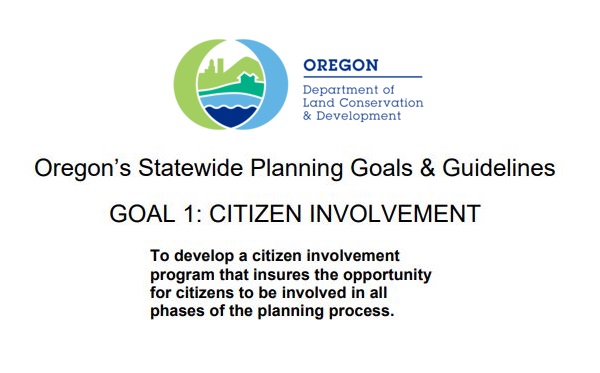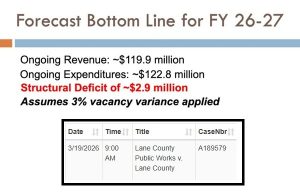Eugene, Springfield to get grant money for climate-friendly planning
4 min read
from the Oregon Department of Land Conservation and Development
Eugene and Springfield are among 15 Oregon jurisdictions that will receive DLCD grants to help implement the Climate-Friendly and Equitable Communities program.
The grants provide consultant and direct assistance to communities for building community engagement plans and studying potential areas to allow more climate-friendly development:
- Increased development where people can live, work, shop and play;
- Improved facilities for walking, bicycling, and transit so people can reach destinations without depending on long driving trips; and
- Reduced parking mandates to free up land for housing and other services.
The program works to strengthen Oregon’s transportation and housing planning, reduce climate pollution, and create more equitable communities.
“During program development, we conducted extensive community engagement, and heard during each phase that Oregonians want more housing choices, more transportation options, less pollution, and more equitable outcomes,” said Brenda Ortigoza Bateman, director of the Department of Land Conservation and Development.
Oregon’s work to address climate concerns has been in progress for more than a decade, starting with the establishment of a greenhouse gas emissions reduction policy by the legislature in 2007.
DLCD and ODOT are committed to providing financial and technical assistance for community implementation of the program. The Oregon Department of Transportation has earmarked more than $15 million to support implementation. DLCD is seeking additional resources.
The Land Conservation and Development Commission (LCDC) will monitor agency and community progress during implementation, with regular updates at upcoming commission meetings.
LCDC is dedicated to ensuring the program helps meet Oregon’s shared goals and will refine the rules if a need for adjustment is identified in the future. Land use provisions in local plans are generally scheduled to be updated by the end of 2024, while transportation plans will be updated during the next several years.
The 15 local jurisdictions are: Albany, Ashland, Bend, Central Point, Corvallis, Eagle Point, Eugene, Grants Pass, Keizer, Marion County, Medford, Philomath, Salem, Springfield, and Talent. Grants total $810,000.
DLCD’s Climate-Friendly and Equitable Communities Program
In 2020, the Oregon Land Conservation and Development Commission directed the Department of Land Conservation and Development to draft updates to Oregon’s transportation and housing planning rules, and to convene a rulemaking advisory committee to help guide rule development to reduce greenhouse gases from driving.
The rules developed significantly strengthen Oregon’s rules about transportation and housing planning in the eight areas with populations over 50,000 people: Albany, Bend, Corvallis, Eugene/Springfield, Grants Pass, Medford/Ashland, Portland Metro, Salem/Keizer.
The adopted rules amend Oregon Administrative Rules Chapter 660, Division 8 (Housing), 12 (Transportation Planning Rule) and 44 (Metropolitan Greenhouse Gas Reduction Targets).
Developed through two years of public process, including more than 200 meetings organized by geography and topics, the program directs cities to identify and update zoning for climate-friendly areas for more compact, mixed use development. They allow communities to deregulate and reform parking rules and require conduit for electric vehicle charging in new development.
The program is consistent with state regulation to require a 20-year supply for housing and employment land, with additional urban growth boundary expansion where warranted.
Oregon has a long history of inequitable development, including in land use and transportation planning decisions. The Climate-Friendly and Equitable Communities program focuses on reducing pollution while also increasing housing choices and creating more equitable outcomes for all Oregonians.
Oregon’s planning system is a partnership between state and local governments. State law and rules direct how local governments develop comprehensive plans, including land use and transportation elements. In order to meet Oregon’s climate pollution reduction goals and policy, state programs and local land use and transportation plans will have to change significantly
Oregon’s land use planning program
Oregon’s land use planning program — originated in 1973 under Senate Bill 100 — protects farm and forest lands, conserves natural resources, promotes livable communities, facilitates orderly and efficient development, helps coordination among local governments, and enables citizen involvement.
The program affords all Oregonians predictability and sustainability to the development process by allocating land for industrial, commercial and housing development, as well as transportation and agriculture.
The Department of Land Conservation and Development (DLCD) administers the program. A seven-member volunteer citizen board known as the Land Conservation and Development Commission (LCDC) guides DLCD.
Under the program, all cities and counties have adopted comprehensive plans that meet mandatory state standards. The standards are 19 Statewide Planning Goals that deal with land use, development, housing, transportation, and conservation of natural resources. Periodic review of plans and technical assistance in the form of grants to local jurisdictions are key elements of the program.





